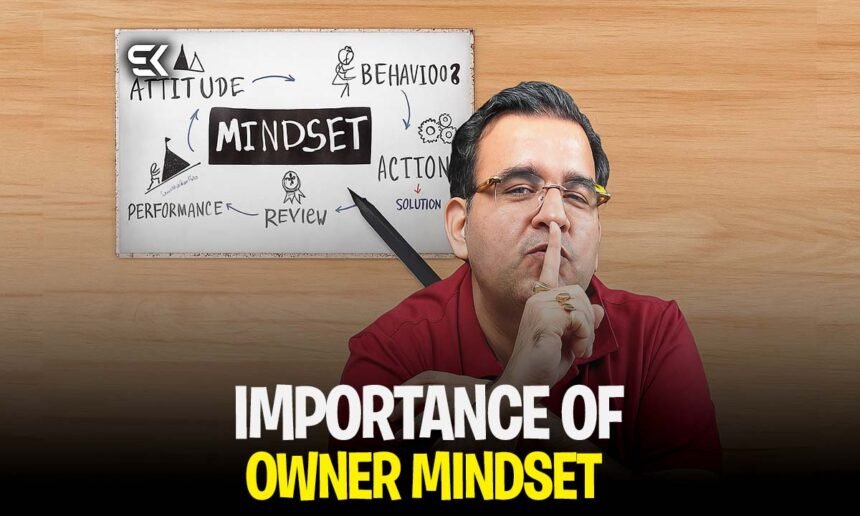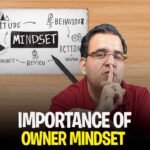Why Your Money Mindset Shapes Financial Success
Have you ever considered that some people work their entire lives and still struggle with money, while others earn so much that even while they sleep, their money continues to work for them? This difference isn’t just about hard work, it’s about thinking—how you think about money changes everything.
- Why Your Money Mindset Shapes Financial Success
- Lessons from the Entertainment Industry on Wealth Building
- Shah Rukh Khan’s Ownership Strategy for Wealth
- Employee vs. Owner Mindset: A Wealth-Building Comparison
- Debunking the Ownership Myth for Financial Freedom
- Top Investment Options for Passive Income
- Income vs. Assets: The Key to Wealth Creation
- Diversification: The Secret to Stable Wealth
- Building an Ownership Mindset Step-by-Step
- Employee vs. Owner: The Wealth Mindset Shift
- Busting the Myth: Wealth Isn’t Just for Entrepreneurs
- Start Your Journey to Financial Freedom Today
Lessons from the Entertainment Industry on Wealth Building
The entertainment industry is a powerful example. Here, we can learn how the concept of “ownership” transforms normal income into long-term wealth. Let’s explore how you can apply this mindset to your own life.
Hollywood’s Passive Income through Residuals
In Hollywood, actors don’t just get paid for a job once. They receive residuals—meaning they get paid again every time their show or movie airs on TV, streams on Netflix, or has a DVD release. Meaning, they work once and keep getting paid repeatedly.
- Example: Actor Adil Hussain earns approximately $5,000-$6,000 (roughly Rs. 5-6 lakhs) every three months for a small role in Star Trek—and that too years after the work has finished.
- Big Earners: Jim Parsons, from The Big Bang Theory, earns approximately $10 million annually from reruns alone. The cast of Friends earns around $20 million annually just from old episodes.
This is passive income—where you do the work once, but the money keeps coming in again and again. Ownership mindset teaches you how to generate long-term returns from your efforts.
Bollywood’s Lack of Residual Income System
Now, if we talk about Bollywood, the picture is a little different. Actor R. Madhavan said in an interview that there is no residual system in India. Here, actors get paid for their work only once, after that, even if the film comes on TV 100 times or earns crores, the actor gets nothing.
- Madhavan’s Insight: He stated that if Bollywood had a system like Hollywood, then only his three films – 3 Idiots, Rang De Basanti, and Tanu Weds Manu – could have kept his family financially secure for generations. But here the producer makes all the money, and the actor gets paid only once.
This is why many Bollywood actors lack financial stability. With no backup or residual income, they are forced to play it safe in their careers, taking roles solely for the money—whether their heart is in the project or not.
Shah Rukh Khan’s Ownership Strategy for Wealth
This is why Shah Rukh Khan made a smart move early in his career—he decided to become a producer. By creating his own production company, Red Chillies Entertainment, SRK went beyond just being an actor; he created ownership. Meaning, he ceased being an employee of the film industry but became the owner of his own assets.
- SRK’s Wealth: Today, SRK is one of the richest actors in the world, with a net worth of approximately $1.4 billion. But this money doesn’t come solely from acting fees. A large portion of it comes from ownership—such as Red Chillies Entertainment, the Kolkata Knight Riders team, real estate properties, and other business ventures.
- Key Lesson: Whether his movie is a hit or a flop, SRK makes money because he’s built his own assets that generate revenue. This is the real difference between an employee and an owner mindset.
Employee vs. Owner Mindset: A Wealth-Building Comparison
Now understand the simple difference:
- Employee Mindset: People with an employee mindset trade their time for money. Meaning, work, get paid, that’s it. Their income can only grow to a certain limit, and their boss controls them. They have a job today, but they might be gone tomorrow.
- Owner Mindset: People with an owner mindset build assets—like businesses, investments, or anything else that earns them money repeatedly. Their focus isn’t on short-term salary, but on long-term value. They aren’t anyone’s employees, so no one can fire them. If their venture is successful, they reap the full reward.
In simple terms: employees rent their time to owners, and the owner creates something valuable from that time. The employee receives a fixed salary, but the owner turns that effort into an asset. Now the power is in your hands—you can sell your time for money, or invest your money to create a system that gives you both time and freedom.
Debunking the Ownership Myth for Financial Freedom
Now, there’s a common myth: “I’m just an employee, I don’t have a chance at ownership.” This thinking is completely wrong. Ownership doesn’t just mean starting a business. You can become an owner by investing a portion of your salary.
Even if you’re employed, if you invest your earned income in the right places—like stocks, real estate, or digital assets—you’re creating a system for yourself that will work for you in the future, without you having to actively work. This is true financial freedom.
Top Investment Options for Passive Income
Dividend Stocks and Mutual Funds for Steady Returns
When you invest in dividend-paying stocks or mutual funds, you essentially become the owner of a company. These investments have two benefits:
- Capital Gains: You earn as the stock price appreciates.
- Dividends: You receive regular dividend payments that become passive income.
Blue-chip companies with a strong history always pay stable dividends, and if you reinvest those dividends, your wealth growth accelerates.
Bonds: A Safe Path to Passive Income
Now talking about bonds, they are a safe and predictable income source. Government bonds, corporate bonds, or bond funds pay you regular interest and your money remains safe. These are less risky than stocks, making them perfect for balancing a portfolio.
Real Estate Investment Trusts (REITs) for Property Income
Then come REITs—Real Estate Investment Trusts. Through these, you can earn rent from commercial real estate without actually purchasing the property. These are regulated investments, provide regular payouts, and add variety to your portfolio. This means you can reap all the benefits of real estate—such as appreciation and rental income—without becoming a landlord.
Direct Real Estate for Long-Term Wealth
If you buy real estate directly, such as a rental property, you receive monthly rent as well as long-term profits from rising property prices. Yes, it requires a little more money and responsibility, but historically, real estate has always delivered strong returns. Rent covers your loan and the property’s value keeps increasing over time.
Systematic Investment Plans (SIPs) for Small Investors
Now, if you don’t have a large sum of money, there’s no need to worry. Systematic Investment Plans (SIPs) are a great option. In this, you can invest small amounts every month in mutual funds, index funds, or ETFs. This disciplined approach helps your money grow slowly, and compound growth builds good wealth in the long term.
Income vs. Assets: The Key to Wealth Creation
Now understand the difference between assets and income:
- Income: Income is what you earn regularly – like salary, business profit, or any freelance earnings. It covers your daily needs—bills, groceries, and expenses. It’s for the present.
- Assets: Assets are things you own that increase in value over time or generate money—like stocks, bonds, real estate, businesses, or intellectual property. True wealth is created when you convert your income into assets.
In simple terms, income finances your life today, and assets secure your tomorrow. This means that if someone has a high salary but spends it all, they are not as wealthy as someone who earns less but regularly saves and invests.
Diversification: The Secret to Stable Wealth
Now let’s talk about diversification. Smart investors never put all their money in one place. Diversification means keeping your investments in different places—such as in different types of assets, industries, and countries. This reduces risk.
- Balanced Portfolio: A balanced portfolio includes stocks from different sectors, different size companies, bonds of different maturities and credit qualities, real estate or REITs, international investments, and some cash.
- Risk Management: When one investment goes down, another goes up—this keeps your overall portfolio stable. This is the most basic and important rule for building long-term wealth.
Building an Ownership Mindset Step-by-Step
Now, if you want financial independence, an ownership mindset doesn’t develop overnight. It’s a step-by-step process—a combination of smart budgeting, disciplined saving, and strategic investing.
- Define Your Financial Goals: Clarify your financial goals—short-term (0–2 years), medium-term (3–5 years), and long-term (5+ years). Write them down, track them, and adjust them if necessary.
- Boost Your Savings Rate: The more you save and invest, the faster your wealth will grow. Withdraw investments from your income first, then spend the remaining.
- Invest Consistently: Money needs to grow, not just be saved. Start with a small amount, and as your income grows, increase your investments.
- Focus on Long-Term Growth: Don’t get caught up in the market’s short-term ups and downs. Hold on to good-quality investments for the long term. This is the true ownership mindset that will give you financial freedom, if not today, then tomorrow.
Employee vs. Owner: The Wealth Mindset Shift
Simply put, the difference between an employee and an owner mindset is simply this: an employee works once and earns money only once, while an owner works once and earns money repeatedly.
You don’t need to be Shah Rukh Khan or a Hollywood star to adopt an ownership mindset. Whether you have a job, you can create ownership for yourself simply through consistent and smart investing—in stocks, bonds, mutual funds, real estate, or any other asset. These investments provide two benefits: the asset’s own value and its growth potential.
Busting the Myth: Wealth Isn’t Just for Entrepreneurs
People often say, “Only business people can get rich,” but that’s a myth. Investing also gives you the power to create passive income and financial independence. Meaning, you transform from a person who sells money in exchange for time to a person whose money works for them.
Start Your Journey to Financial Freedom Today
The perfect time to get started is now. Choose an investment option that matches your goals and risk level. Set up automatic contributions to maintain discipline. Be regular and consistent. Gradually, you’ll have a portfolio that generates income for you, even if you’re not actively working—just like actors receive residuals. This will become your true financial security system for you and your family’s future.
Take the First Step
So, what are your investment plans? Share your thoughts and share this article with friends who want to move from an employee mindset to an owner mindset.








